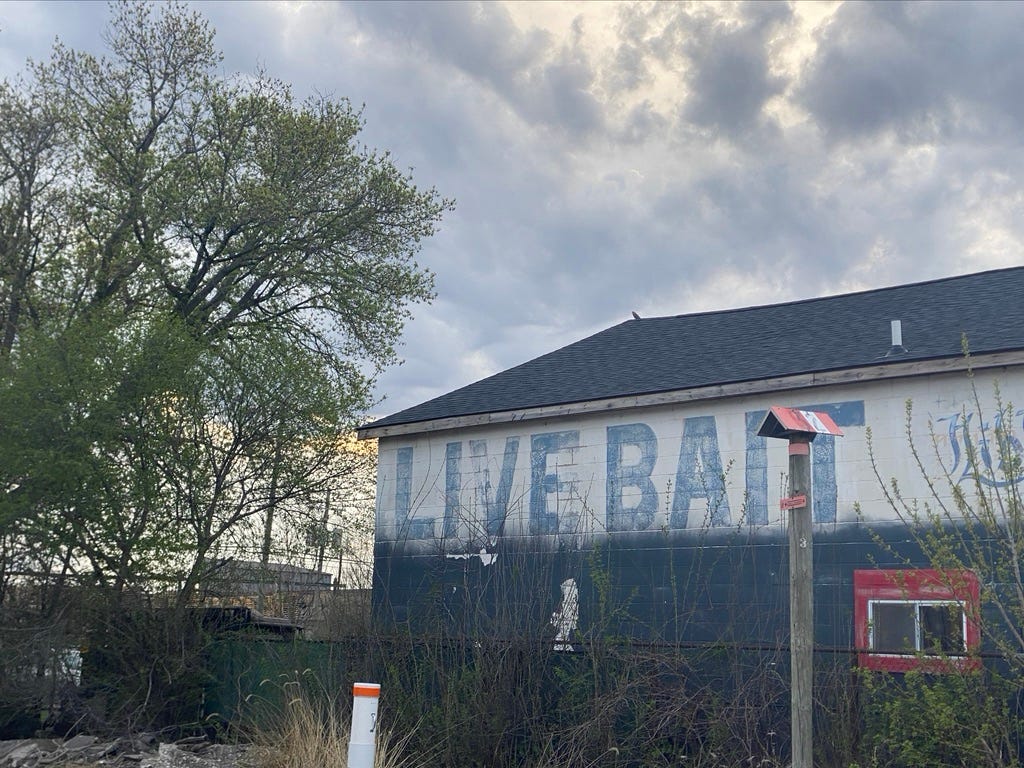Note: I would be remiss if I wrote about anything else to do with college students without first mentioning the incredibly brave anti-genocide protests and encampments popping up on campuses nationwide recently, and the savagery with which university administrations and city/state governments have cracked down on them. These students have stayed impressively disciplined and on-message in their defense of Palestinian lives despite a full court press by the American media and the American president to paint them as violent, lazy, insane, hateful, etc. Despite what the rest of this newsletter is about, the average student walking into my classroom has a more steadfast moral compass than anyone who gets paid to talk on TV in this country. I encourage you to find ways to support the student protestors in your own area (and Palestinians themselves) with your own time, money, resources, and presence.
Last December, having just wrapped my first semester teaching introductory composition at Wayne State University, I published a piece on my grading and classroom policies as a way of encouraging other teachers to consider just how many ways punishment, surveillance, and invasive technology have become normalized in our profession.
One thing that had crystallized for me during that semester was that I wanted to rethink notions of “academic misconduct,” especially as they applied to the burgeoning trend of using ChatGPT and other AI tools to write papers. I devised a system for trying to manage this, as described in that piece:
This is obviously a thorny situation, made more so by the principles I am practicing adhering to, which include not seeking proof of AI usage (and therefore not making accusations of it). But what I ended up choosing to do was marking the drafts incomplete and providing feedback as though they had been written by students who had simply fallen short of the standards described in the rubric. I demanded more analysis, more quotations, more evidence of their own language and thinking (none of which an AI tool can provide, though it attempts to in many laughable ways). I required multiple rounds of revisions from students in each case so that they would be forced to participate in the generative act of writing as part of the process, but I levied no accusations of plagiarism or misconduct.
Put simply, parts of that framework fell apart this semester. I did what I said I would never do, and by the end of the term had confronted individual students dozens of times about their AI usage, and refused to grade that work until it was rewritten as passably the student’s own.
I made this change—one that I never stopped feeling nauseous over—for two reasons. One is that I taught two sections instead of one, meaning I had forty-five students instead of twenty-three. The course has five essays and ten writing journal entries, which meant that even before multiplying each of those by the x number of revisions required to get them up to the standard, I was on the hook for grading 675 assignments in fifteen weeks. (My graduate teaching stipend is just shy of $21,000 per year, if that helps add context.) Last semester I had the time and energy to treat AI writing as though it were the student’s own. This semester there were truly not enough hours in the day.
The other major reason is that this semester I had a sizeable chunk of students for whom English was not their first (and in some cases even their second) language. Those students, for a host of reasons, were far and away the most disproportionately heavy users of AI tools. I worked hard to tamp down my initial feelings of annoyance at this group, who (unlike most of my American-born students) could not be talked out of doing it the first or even the eighth time I brought it up. Still, I stand by the main point of my previous piece on this issue: my principles require me to seek to understand the context of people’s behavior. In the case of these students, they were largely driven by what they had been led to believe—and not incorrectly!—are the main purposes and priorities of American higher education, which are getting things done, getting credentialed, and looking impressive. In this they aren’t wrong; as education gets more exorbitantly expensive, and the financial and career prospects of young people more terrifyingly precarious, the entire university system has oriented itself away from the kinds of slow, process-driven exploration (of both topics and the self) that I am told college used to allow for.1 Finishing is, across the board, more of a priority than any kind of actual reckoning with the content of one’s work, or what the process of knowledge-seeking might do for someone, or for others.
So: I don’t hate or resent these kids. (There were some late nights this semester where I felt awfully prickly at the amount of my own time they were eating up, I will confess.) In fact, their example revealed to me a great deal about my own biases: it was only after two of them turned in nearly identical polished journal entries that said absolutely nothing of substance that I realized one of my white American students had done the same thing with that assignment, which I had already accepted uncritically as their own work (albeit work that needed some improvements). Clearly I still have a lot to learn, and to unlearn.
From a curriculum standpoint, all of this left me in the position of building the plane as I flew it, which felt even more stupid and insulting because of how thoroughly I thought I had planned the semester and its components. Week by week I was forced to adjust plans and procedures and to change my own policies, sometimes expressing those policy changes to students, sometimes keeping them as private notes to myself and making decisions about what to allow from students on a case by case basis, a subjective process which I had thought that my labor-based grading structure would allow me to avoid.
Because of the proliferation of AI tools like ChatGPT, I find myself caught up in an arms race that I never asked to be a part of, and in which there are no winners. My approach to a liberatory pedagogy has been complicated by my internal struggles about what I can and cannot countenance from my students. I struggle with feeling ownership and responsibility over this particular course—why do I care so much when they pay me so little? I struggle with the pettiness of not wanting students to feel like they’ve gotten one over on me—why again? Aren’t I the adult here? I struggle with whether the rest of the world is right about the need to teach kids “hard” lessons—as in, punishment and failure—because “they’ll have to learn eventually.” Is it true that I do them no favors by shielding them from consequence, for a little while, in a world that will never do that? These are the questions that keep me awake at night.
It’s possible that all of this could lead to some smugness on the part of people hearing it. There is a mean and punitive streak in our culture that seems to make people jump at the chance to gloat when they hear about an attempt at radical kindness, an attempt at refusing the harmful assumptions and practices of our society. There’s a paternalistic sort of gloating that happens in these moments, when the person attempting kindness gets exposed as naïve. Good of you to try, as they pat you on the hand, but really, this is just human nature, and eventually you’ll have to stop coddling them and come to terms with it.
But more than anything what this has all revealed to me is that I need to find a way to deepen those first principles I addressed in my last piece. I need to find ways to encourage growth, incentivize participation in the process itself, and make my classroom a safe space to fail and to fuck up. Student behavior wasted a lot of my time this semester, but even more of it was wasted by the fact that I fell right back into the trap of seeking out and fighting back against every real or perceived act of student misconduct. I was fighting back differently than many of my colleagues, many of whom would have reported the students, failed them, or both, but I was fighting all the same. Like I said: this arms race is not one that I can win on its own terms. I don’t have all the answers yet, but I continue to suspect that the only way to win this game is to not play it at all. (And if I never figure out how to do that, well: AI will have succeeded at doing what low pay and the constant threat of a school shooting won’t, which is getting me to quit the profession.)
Maybe, in the end, the answers to all of these questions are found in the others. Ultimately, the core idea here—that writing is worthwhile in and of itself, and that it’s my responsibility to help students become better writers through this process—still matters to me a great deal. And my guiding principles—that models of punishment and surveillance should not be normalized, that I can nurture more growth with openness and understanding than with suspicion and anger—are still there when I’m ready to accept all that they might require of me.
Despite my general malaise here, there are still hopeful moments that shine through the gloom and remind me that what I’m trying to do is worth it. On the last day of class, students were asked to make a short presentation on the final essay they were writing, which was about a theme that had developed in their work during the semester. The last student to present gave a moving overview of how having to revise all of her work in my class had gone from something that gave her anxiety attacks (to the point where she would put her phone on airplane mode for hours after turning something in to avoid receiving an “incomplete” assignment notification) to something that taught her to identify her strengths and move forward with confidence as a writer. She mentioned as an example the poem she had submitted to me to fulfill a creative writing extra credit assignment. The poem dealt with her identity as a young, queer Black woman, and how her public persona of confidence is a facade covering her terror about what the world thinks of her. At the beginning of the semester, she said, she would have been mortified to share that poem with anyone, much less be willing to accept constructive criticism about it. But because of the writing process established in our classroom, she learned to trust me (as someone whose feedback was worth listening to) and, more importantly, herself (to know which parts of the poem she was willing to change and which she was confident in standing behind).
The class demanded she read the finished poem aloud, and she performed it with a passion that just about tore my heart out. And for the rest of my career I will carry with me the cheers she got. Imagine that: to be eighteen and to be unashamed to open your entire self up to your peers like that; to be eighteen and to shout and cry for a classmate like that. Standing there watching that magic happen made every other headache and heartache worth it.
Thanks, as always, for reading. I’ll talk to you next time.
-Chuck
PS - If you liked what you read here, why not subscribe and get this newsletter delivered to your inbox each week? It’s free and always will be, although there is a voluntary paid subscription option if you’d like to support Tabs Open that way.
The financial pressures here also disincentivize student activism—see recent calls by US legislators to withhold student loan forgiveness from protestors.








You may (not) be surprised to hear that these are the same type of struggles occurring down at the beginning of the education journey. The last two weeks my kindergarteners and I have been focusing on “integrity,” and through that might not mean real, honest writing without AI, they’re also tempted constantly to take the easy way out (not being truthful, skimping on their class job, copying math work). This will always be true, though I think your situation is way more complex since it involves grades and degrees and such. What struck me as most similar though is the conundrum of capacity: there’s only so much time to teach these vital things and we can only do so much given our caseload, and it’s maddening to have to triage. Thanks again Chuck and keep it up ✊
You are helping them become not just better writers and better thinkers, but better human beings. Keep up the (difficult, exhausting, frustrating, infuriating) good work, Chuck!